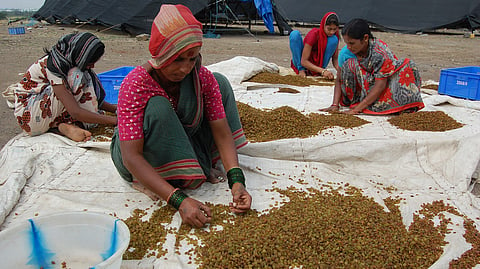

VIJAYAPURA: After four years of continuous losses and price slumps, grape farmers in North Karnataka are finally seeing a turnaround as raisins have fetched good prices, offering much-needed relief to growers this year who had been severely distressed since the Covid-19 pandemic.
During the pandemic years, raisin prices hovered between Rs 60 and Rs 150 per kg, trapping farmers in debt without even covering production costs. Now, as the prices have surged between Rs 180 and Rs 380 per kg, farmers are witnessing a significant recovery. Some farmers have even secured record-high rates, bringing a renewed sense of hope.
However, the improved prices come amidst a fall in production. “Excessive monsoon rains, severe cold spells between October and December, and heavy dew led to widespread disease and stalk fall in vineyards. As a result, overall yield has fallen by around 65 per cent,” said state president of Grape Growers Association Abhykumar Nandrekar.
He said that typically, around 20 tonnes of grapes are produced in each acre of land, which helps in preparing 4.5 tonnes of raisins each season, but this year, production of grapes has dropped to around 12 tonnes an acre due to vagaries of nature.
Despite the reduced yield, the higher prices have compensated for the shortfall. Many farmers who had uprooted their grapevines due to mounting losses are now showing interest in grape cultivation again. Officials said North Karnataka has about 37,000 hectares under grape cultivation, with Vijayapura district leading the area, followed by Bagalkot and Belagavi districts.
As far as the total production of raisin is concerned, all three districts together normally produce around 2.30 lakh tonnes of raisin, but this year, due to loss, total production has come to around 65,000 tonnes only,“If grape growers continue to receive good prices for another two years, they will be able to fully recover from the losses of the past,” Nandrekar, said.
“Farmers have faced heavy losses with 65% crop damage due to extreme weather. The government must provide compensation and ensure proper crop insurance support,” he said.